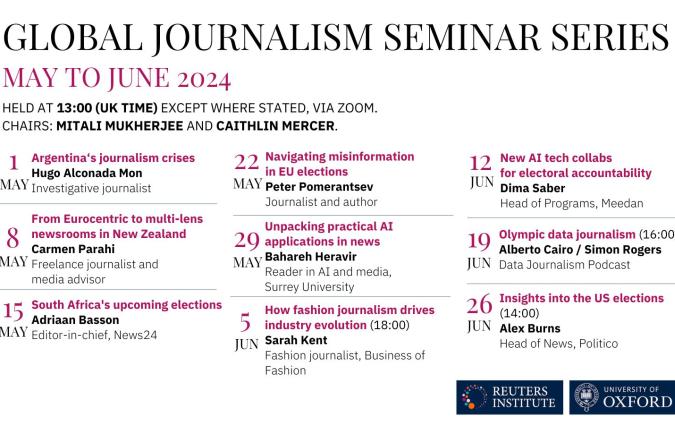Keep your emotions in check and three other tips to think rationally about data

FT columnist Tim Harford.
The speaker
Tim Harford is one of the UK’s best known statistical journalists, and a columnist for the Financial Times. He presents BBC Radio 4’s statistics programme More or Less and is the author of several books including The Undercover Economist and the upcoming How to Make the World Add Up. At our Journalist Fellowship Summer School in September, Tim shared his thoughts on how journalists can better engage with statistics and statements designed to shape how we understand the world.
Why statistics matter
The number of news sources and channels through which we receive information means it's more important than ever to understand how we engage with statistics.
-
In February 2020 the World Health Organisation declared that the over-abundance of information about coronavirus was “making it hard for people to find trustworthy sources and reliable guidance.” | The Conversation
-
A survey of journalists found 80% said it was very important to ‘interpret statistics from sources’ but only 25% said they were very equipped. | Nieman Lab
Watch the video of Tim’s talk
Four takeaways from the talk
You are more gullible than you think. “If you want to believe something enough, you’ll believe it. If you want to disbelieve something enough, you’ll disbelieve it, even though it may well be true,” Tim said. He added that our own biases make it difficult to treat new information objectively, particularly if we have a vested interest in believing or disbelieving it. He shared findings from a study dividing test subjects into ‘farmers’ and ‘bakers’. When presented with the same evidence, both were likely to forecast hypothetical wheat prices to the advantage of their designated profession.
Be aware of your emotions. Tim advised journalists presented with statistics, or other forms of information, to ask themselves: “How do I feel about this? What is my emotional reaction to what I’ve just been told?” Although it’s impossible to completely overcome our reactions, being calm and noticing how we feel is a good defence to engaging with data in the wrong way. He shared a recent occasion when his own clouded judgement led him to hastily share a feel-good statistic around support for same-sex marriage before only later realising the chart he retweeted was flawed.
Is it surprising? Be careful. “A lot of the things [that] we report on as journalists we report on because they’re surprising. They might be surprising because they’re new. They might be surprising because they’re just wrong,” Tim said. He recalled writing a column for the Financial Times around relative COVID-19 risk. A surprising but incorrect statistic (comparing the risk of the virus to taking a bath) towards the end of the piece was published as fact in several tabloids due to its eyebrow-raising nature.
Keep an open mind. Tim also advised that “keeping an open mind, not falling into the trap of wishful thinking, asking the right questions, being sceptical – but not too sceptical” are healthy approaches to dealing with any subject including statistics that benefit journalists as much as they do number crunchers.
The bottom line
In a month whose major news stories have been dominated by statistics, be it around COVID-19, Brexit or climate change, Tim’s talk was a valuable lesson for journalists on how and why they should approach numbers calmly and rationally. And these lessons do not just apply to the world of probability, variability, means and medians. As Tim said, “thinking clearly about statistics really means the same sort of habits of mind as thinking clearly about anything else.”
If you want to know more...
-
Read 'Statistics, lies and the virus: Tim Harford's five lessons from a pandemic' | Financial Times
-
Listen to the 'Cautionary Tales' podcast. | Apple podcasts | Spotify
-
Read this excerpt from Tim's new book. | Guardian
-
Watch Denise Lievesley's seminar on how journalists should think about statistics. | Reuters Institute







